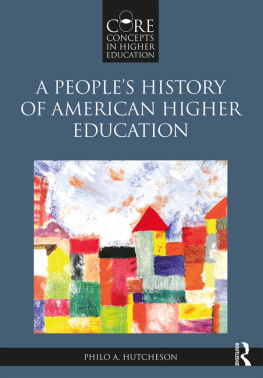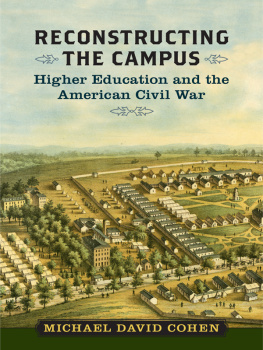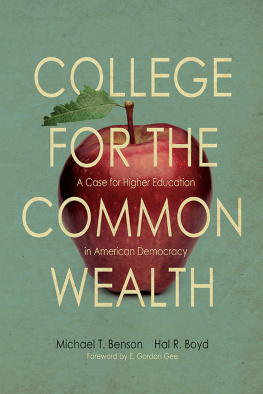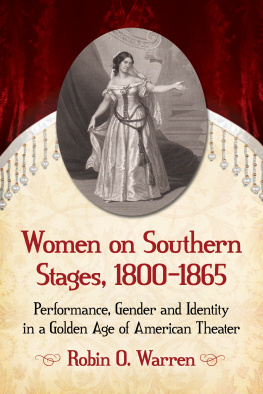The Education of the Southern Belle
THE EDUCATION OF THE SOUTHERN BELLE
Higher Education and Student Socialization in the Antebellum South
Christie Anne Farnham
Copyright 1994 by Christie Anne Farnham
All rights reserved
Library of Congress Cataloging-in-Publication Data
Farnham, Christie Anne.
The Education of the southern belle : higher education and student
socialization in the antebellum South/Christie Ann Farnham.
p. cm.
Includes bibliographical references (p. ) and index.
ISBN 0-8147-2615-1
1. WomenEducation (Higher)Southern StatesHistory19th century. 2. Education, HigherSocial aspectsSouthern StatesHistory19th century. 3. Education, HigherSouthern StatesCurriculaHistory19th Century. 4. Iterpersonal relationsHistory19th century. 5. WomenSouthern StatesSocializationHistory19th century. I. Title.
LC1757.F37 1994
376.975dc20 93-5690
CIP
New York University Press books are printed on acid-free paper,
and their binding materials are chosen for strength and durability.
Manufactured in the United States of America
10 9 8 7 6 5 4 3 2 1
To
CHRISTINE SUTTON FARNHAM
graduate of a Southern
womans college
Contents
Acknowledgments
THE gestation of this study has been long and laborious. Begun with a more restricted focus in the late seventies, it was frequently waylaid by the demands of teaching, administration, and family. In the long run this has proven to be a blessing, because the vast number of studies on related themes published during the intervening years has deepened my understanding of the issues that must be addressed in any study of higher education for women.
Such an extended period of research leaves me indebted to individuals and archives too numerous to mention. However, my debt to the following merits special thanks: John Hope Franklin first introduced me to this topic and supervised my dissertation at the University of Chicago on female seminaries in North Carolina. The American Council of Learned Societies and the Indiana University Womens Studies Program awarded me postdoctoral travel grants for the purpose of enlarging my study to the entire antebellum South. Various portions of this work have benefited from the evaluation of commenters and audiences at meetings of the History of Education Society, the Western Association of Women Historians, and the Southern Womens History Association.
Several scholars have generously accorded me the benefit of their expertise: Mary Beth Norton, Jacqueline Jones, and Nancy Naples read chapters on early educational institutions, faculty, and romantic friendships, respectively. Joan Hoff was a continuing source of encouragement. My colleagues at Iowa State Universityespecially Clair Keller, Alan I. Marcus, George McJimsey, Adrejs Plakans, Robert Schoefield, and David Wilsonread drafts of chapters on college curricula and the socialization of the Southern belle. Dorothy A. Gay and Martha S. Stoops kindly shared their knowledge of the sources with me, and Keith Melder shared a draft of his study of the seminary movement. Leon Apt referred me to comparative works in European history. I am especially indebted to numerous archivists, of whom I would like to single out Patricia J. Albright of Mount Holyoke College, for tracking down information on some of their early graduates. Special thanks also go to several anonymous reviewers who provided me with meticulous readings of the manuscript. Although I am unable to thank them by name, I hope that they will recognize the fruits of their efforts on my behalf. In the last analysis, of course, any errors remaining of fact or judgment are mine.
Finally, I wish to thank those individuals, without whose warm and unstinting support over the years, I would not have been able to bring this project to fruition. My former colleague in the Afro-American Studies Department at Indiana University, William Wiggins, and Phyllis Martin of Indianas history department were especially supportive. The family of Dr. Samuel Putnam graciously offered my family the use of their home during one stint at the Southern Historical Collection and made no complaints when all of the pet gerbils and hamsters entrusted to our care died, one by one. My mother, Christine Sutton Farnham, provided me with a computer and printer as well as companionship to the Louisiana State Universitys archives. Sarah Haydock Pope, a mainstay of our family, has encouraged my work from its inception. My daughters and sonsDulany Lucetta Pope, Delanie Penrose Pope, Whitney Bancroft Pope, and Norwood Braxton Popealthough disliking being forced to tag along on research trips or to take up the slack in my absence, have always believed in the project. Their father, Whitney Pope, deserves the most thanks, because he made the most sacrifices enabling me to write this book.
The Education of the Southern Belle
Introduction
EDUCATION is powerthe power to inculcate a worldview or to empower a viewer of the world. Yet, the subject of womens education has received much less attention than its importance as a key aspect of womens changing status dictates. As late as 1984, Anne Firor Scott complained of a curious myopia that afflicted revisionists as well as traditionalists. For both groups of historians education meant either the instruction of men or of children whose sex was unspecified. generalizations drawn from recent scholarship have yet to be systematically tested against the Southern case.
There are several reasons for this historiographical lacunae in Southern scholarship. The two most significant factors were the absorption of historians of the South in the study of race, as a consequence of the civil rights movement, and the preoccupation of historians of women with the idealogy of separate spheres, as the most engaging metaphor for explaining the changing status of white women in the northeast. Whereas Southern historians tended to ignore womens access to education, womens historians employed a paradigm designed to explain the emergence of middle-class women in the northeast.
The unconscious assumption that research on education in the North can stand for the experience of the South also stems from conventional academic wisdom, which defines Southern education as both derivative and deficient when compared to that of the North. On the face of it, this view appears to be accurate. Faculty were drawn largely from the North and Southern institutions and curricula were consciously modeled after prominent Northern schools. It was Northerners, often women like Emma Willard, who were prominent in upgrading curricula and Northern institutions like Mount Holyoke that had the highest reputation for intellectual rigor. The pages that follow, however, challenge this view as too simplistic.
Like most things Southern, education was imported from elsewhere; but in its incorporation into Southern life, it took on additional functions and meanings. The ideal of the Southern lady and its adolescent counterpart, the Southern belle, do not exemplify a new set of roles resulting from the growth of industrialization and urbanization, for the South remained tied to commercial agriculture. Instead, they represent a romanticization of white domination in a slave society. By merging the lady of separate spheres ideology being articulated out of the modernization experiences of the North with notions drawn from chivalry and a glorification of myths of Anglo-Saxon culture, the hierarchical similarities between lady and serf and lady and slave were reinforced and extended. Southern schools utilized both the formal curriculum of the liberal arts and the informal curriculum of instructing in ladylike values and etiquette acquired from the North to inculcate this Southern version of femininity.






